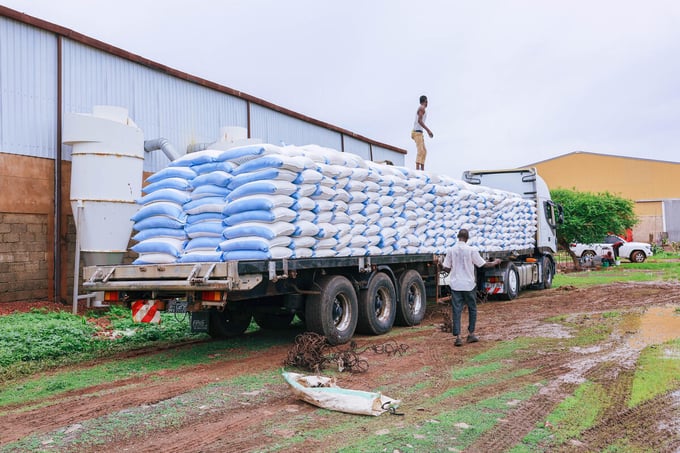November 25, 2025 | 07:00 GMT +7
November 25, 2025 | 07:00 GMT +7
Hotline: 0913.378.918
November 25, 2025 | 07:00 GMT +7
Hotline: 0913.378.918

FAO and its local partners distributed more than 5,000 tonnes of sorghum and millet seeds to more than 2.7 million people in Sudan last year.
Urgent action, in particular immediate and unimpeded humanitarian access, is required to address the widening famine in Sudan, where almost 25 million people face acute food insecurity, the Deputy Director-General of the Food and Agriculture Organization of the United Nations (FAO), Beth Bechdol, told a UN Security Council meeting in New York.
FAO was invited to brief the Security Council on the deeply concerning situation in Sudan, where a protracted armed conflict and forced displacements are driving an unprecedented food crisis in Africa's third-largest country.
According to the latest analysis from the Integrated Food Security Phase Classification (IPC), half of the population – or 24.6 million people – are facing acute food insecurity levels. This is 3.5 million more people since June 2024.
The latest report by the IPC, a multi-partner initiative for improving food security and nutrition analysis and decision-making, is the worst in the country’s history. Widespread starvation and acute malnutrition have already resulted in tens of thousands of deaths in a country where almost two-thirds of the population depends on agriculture.
Production of key crops such as sorghum, millet and wheat during the first year of the conflict – the 2023/24 season – was down 46 percent from the previous year. This production loss could have fed approximately 18 million people for a year and represented an economic loss of between $1.3 and $1.7 billion.
Restricted humanitarian access is exacerbating the situation, while sustained violence and economic turmoil have disrupted markets, driving the price of staple goods to unaffordable levels.
This marks the fourth time that famine has been confirmed in a country over the past 15 years, Bechdol reminded today's meeting as she highlighted the Security Council’s critical role through Resolution 2417, which highlights the link between conflict and hunger.
"We must take urgent action to address the famine in Sudan," Bechdol said.
"If we fail to act now, collectively, and at scale, millions of lives are even further at risk, and (…) so is the stability of many nations in the region," she added.
According to Bechdol, the following actions deserve prioritizing and require the Security Council's support: 1) political leverage to end hostilities and bring relief to the people of Sudan; 2) immediate and unimpeded humanitarian access, as well as safe reopening of commercial supply routes to address current shortfalls in key hunger hotspots, as stated recently by FAO and its UN partner agencies; 3) the delivery of multi-sectoral humanitarian assistance, especially emergency agricultural support which is key to ensuring local food production, building resilience and preventing further humanitarian catastrophe.
FAO's impact in Sudan
Thanks to FAO and its local partners, last year more than 2.7 million people in 11 states received more than 5,000 tonnes of sorghum and millet seeds, with okra seeds prioritized for camps hosting internally displaced people (IDP).
In addition, almost 600,000 agropastoral households benefited from livestock vaccinations, feed, and veterinary services to keep animals alive and healthy – a vital source of nutrition and income.
However, challenges remain.
Heightened security risks for transportation providers, for example, hinder access to vulnerable communities, while funding gaps remain misaligned with the agricultural calendar, limiting FAO's ability to act at the most critical times.
In this coming year, FAO aims to scale up its response to reach 14.2 million people—farmers, livestock herders, and fishermen and women—with the seeds, livestock feed and fishing supplies they need to produce their own nutritious food, Bechdol said. In order to do so FAO requires $156.7 million for 2025.
"No one affected by the conflict—whether in an IDP camp or their home community—wants to depend on food aid. They want to provide for their families and reclaim their dignity. Delaying this support risks deepening food insecurity," Bechdol said.
(FAO)

(VAN) Brazil's COP30 presidency pushed through a compromise climate deal on Saturday that would boost finance for poor nations coping with global warming but that omitted any mention of the fossil fuels driving it.

(VAN) Poultry farmers in the UK have been warned that they could face one of the worst winters yet for bird flu.

(VAN) Prices of main-crop paddy have risen sharply, with jasmine rice hitting 16,100 baht per tonne — the highest level in years.

(VAN) In Brazil, FAO unveiled a series of reports and initiatives showing how sustainable agrifood systems are a solution to the climate crisis.

(VAN) With names like neodymium and dysprosium, rare-earth elements sound exotic — and their perceived scarcity has only added to the mystique.

(VAN) In a new study published in Trends in Biotechnology, researchers used a gene-editing technology called CRISPR to increase a fungus's production efficiency and cut its production-related environmental impact by as much as 61%- all without adding any foreign DNA.

(VAN) A top official in Beijing’s Cop delegation says China is committed to clean energy – but US’s absence is a problem.